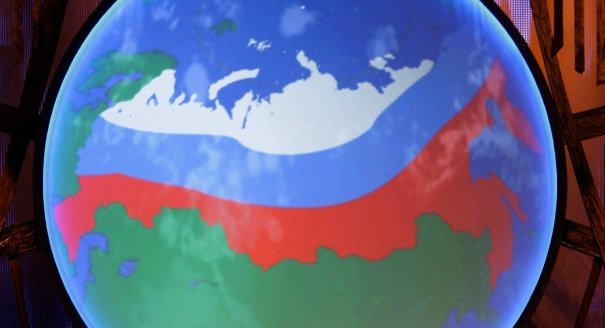The bills differ in minor but meaningful ways, but their overwhelming convergence is key.
Alasdair Phillips-Robins, Scott Singer
{
"authors": [
"Dmitri Trenin"
],
"type": "legacyinthemedia",
"centerAffiliationAll": "",
"centers": [
"Carnegie Endowment for International Peace",
"Carnegie Russia Eurasia Center"
],
"collections": [],
"englishNewsletterAll": "",
"nonEnglishNewsletterAll": "",
"primaryCenter": "Carnegie Russia Eurasia Center",
"programAffiliation": "",
"programs": [],
"projects": [],
"regions": [],
"topics": []
}
Source: Getty
The Russian empire is over, but the belief that Russia is finished as a serious global player might be premature. Today, Russia’s goals include modernizing, creating a nation-state, and finding the country’s new role in the world.
Source: The Globalist

The Russian empire is over, never to return. The enterprise that had lasted for hundreds of years simply lost the drive. The élan is gone. In the two decades since the collapse, imperial restoration was never considered seriously by Russia's leaders, nor demanded by the wider public.
Rather, Russia has gone in reverse — expansion has yielded to introspection, and grandiose public schemes have made their way to myriad private agendas. This is a Russia the world has not known before the start of the 21st century.Fascinating as Russia's post-imperial story may be, in its key features, it is hardly unique. Other countries, such as Germany and Japan in World War II, "lost everything," then revived themselves soon afterward. Still other countries, following the end of the Cold War, went through succession conflicts, as in the former Yugoslavia, before they moved toward new integration within the European Union.
The Soviet Union's split was not quite as graceful as Czechoslovakia's, and most of its constituent parts did not manage to integrate with more advanced neighbors. But in the last 20 years, the Russian Federation did not fare too badly. What makes Russia different is that, having closed the books on itself as an empire, it has managed to continue, without interruption, as a major power.
There was no new Marshall Plan in the 1990s, although much aid did flow Russia's way. But then, in the 2000s, Moscow earned hundreds of billions of dollars of oil money. True, Russia did not integrate into the European and Atlantic institutions, but it is a significant independent player on the international scene and has a chance of becoming a modern power.
The belief, shared by so many in the West, that Russia is essentially finished as a serious country is still to be tested and might well be premature. What is important is that the future lies entirely in Russia's own hands, and there are enough resources to make it a happy one.
Here, it is useful to keep in mind that post-World War II Germany did not rise because it had great friends (who also doubled as its occupying powers), but largely because of its homemade Wirtschaftswunder, or economic miracle.
It was the Deutsche mark, it was Adenauer's Westbindung and Erhard's Soziale Marktwirtschaft — integration into the Western world and its social market economy — that did the job. Until Russia itself rises to the occasion, its modernization alliances will have only limited impact. For now, however, the outlook is clouded.
Russia is no longer an empire, but it is not yet a nation-state, either. Put differently, it is yet to become a republic — in the literal meaning of the word, res publica. Russians need to unite in a joint enterprise, but they first have to agree on the rules and agree to stick to them.
While the private is still king — and virtually overshadows the public — in today's Russia, there are indications that this universal aloofness from fellow countrymen may be coming to an end. The idea of individual survival and success allowed the more energetic members of society to rise and prosper.
However, it is beginning to dawn on some of them already that their private agendas may not be fulfilled in the future due to the constraints imposed by the ossified system. The system is stronger than any individual, and so individuals need to unite and go public in order to achieve their private goals.
It is time that the Russian people came together and began to structure their society according to interests and basic worldviews, with a sense of belonging to a single nation that can accommodate them all. The 2010s are likely to see this momentous change in attitude.
In an interesting parallel with its residents, Russia as a unit, an international actor, is also living for itself. There is no ideology, no clear set of values, but a very strong sense of pragmatism. The motto is simple: to survive, and to succeed, using whatever means available. This pragmatism allows no room for empire building.
Russian leaders have agreed among themselves: no more expensive ideological nonsense, no more material self-sacrifice, and no more subsidies for others. The Soviet Union acted abroad as a big spender. The Russian Federation is constantly on the lookout for opportunities to make money.
Russia is moving toward modernity, by fits and starts. Its current modernization drive — powered from above — is largely motivated by the Kremlin's concerns over its role in the world. Modernization, which requires pervasive liberalization and eventually a genuine democracy, confronts the Russian state and Russian society alike with serious challenges. It is not clear at all that they will meet these challenges.
If Russia's fails in its attempt to modernize, however, it will almost certainly lead to its marginalization, deterioration and decay. The last decade's model of success, built on ever-rising oil prices, has revealed itself as unsustainable. In the worst-case scenario, the country's physical disintegration cannot to be ruled out.
The Russian leadership faces a difficult, seemingly impossible, dilemma: to leave things as they are means steady decline and ultimate fall, even in the leadership's own lifetime. But to start changing things in earnest entails the risk of losing control, power and property. They may want to be Peter the Great, but they are afraid to end up like Mikhail Gorbachev.
The Russian Federation, however, is still looking for a new place and a new role in the world. So far, it sits uncomfortably on the periphery of affluent Europe and dynamic Asia while apprehensively rubbing shoulders with the Muslim world.
However, the new freedom from geopolitical involvement in Europe and Asia allows Russia to concentrate on itself — and to use the whole world as a resource and a market.
This article is adapted from Post-Imperium: A Eurasian Story (Carnegie Endowment for International Peace) by Dmitri Trenin.
Carnegie does not take institutional positions on public policy issues; the views represented herein are those of the author(s) and do not necessarily reflect the views of Carnegie, its staff, or its trustees.
The bills differ in minor but meaningful ways, but their overwhelming convergence is key.

Alasdair Phillips-Robins, Scott Singer
A prophetic Romanian novel about a town at the mouth of the Danube carries a warning: Europe decays when it stops looking outward. In a world of increasing insularity, the EU should heed its warning.

Thomas de Waal
For a real example of political forces engaged in the militarization of society, the Russian leadership might consider looking closer to home.

James D.J. Brown
The risk posed by Lukashenko today looks very different to how it did in 2022. The threat of the Belarusian army entering the war appears increasingly illusory, while Ukraine’s ability to attack any point in Belarus with drones gives Kyiv confidence.

Artyom Shraibman
Washington and New Delhi should be proud of their putative deal. But international politics isn’t the domain of unicorns and leprechauns, and collateral damage can’t simply be wished away.

Evan A. Feigenbaum